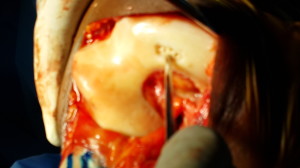Have you damaged your knee cartilage? Cartilage injuries are very common. They occur in 60% of people undergoing a knee arthroscopy. Cartilage injuries occur in sports or accidents. Neglected ACL injuries can also lead to cartilage damage. Other causes of cartilage damage are overloading of the joint due to bow legs, obesity, excess activities etc.
Repair of damaged cartilage damage with Autologous chondrocyte implantation can restore normalcy. If done early, it can improve your quality of life and return to normal activities. It will allow you to continue using your knee and postpone a knee replacement. It is suited for young patients in the age group 25- 45. It is not recommended for elderly patients with advanced osteo-arthritis & rheumatoid arthritis. I was the first surgeon to start Cartilage regeneration in Chennai in 2005 with a procedure called Microfracture.
Back ground information– All mobile joints are covered by articular cartilage. It cushions the bone ends and acts as a shock absorber. When it is healthy, joints move smoothly and painlessly. If it is damaged, joints begin to hurt and grind. Normally there is a balance between formation and destruction of cartilage. Its regenerative capacity decreases with age. Articular cartilage damage cannot heal on its own in adults. Continuing cartilage damage can result in degenerative arthritis.
Mechanism of articular cartilage damage-
1) Sports injuries/accidents.
2) Bow legs and knock knees.
3) Obesity.
4) Heat.
5) Chemical injury
Symptoms -pain, swelling and grinding noise suggest possible cartilage damage and need evaluation.
Evaluation consists of arthroscopy / MRI scans.
If there is cartilage damage, it is better to get it repaired as long term studies support it.
Surgical techniques of cartilage repair- Stem cells are used for cartilage repair. The common site which I use for obtaining stem cells is the bone marrow.
The surgical options are of two types. a) Restorative and b) Reparative. Autologous chondrocyte implantation is a restorative procedure.
a) Autologous chondrocyte implantation (ACI). It means that your own cartilage stem cells are implanted in the damaged area after prior processing.
It is done for small to medium areas of cartilage loss. A suitable patient is one who is symptomatic, not over weight and has a stable knee with intact ligaments.
The procedure has three steps.
Step 1- Key hole surgery(arthroscopy). Areas of deep loss are noted. A small plug of cartilage is harvested by a key hole surgery from a non weight bearing portion.
Step 2– Cells are cultured in the lab for four to five weeks.
Step 3- Implantation of chondrocytes into the damaged area through key hole or open procedure.
Another restorative procedure is Mesenchymal cell induced chondrogenesis. In this procedure pro genitor cells are obtained from the bone marrow. They are centrifuged to obtain a product known as bone marrow aspiration cytology ( BMAC). This is delivered to the prepared damaged area. Cartilage repair occurs with hyaline like cartilage. It takes about a year for the reparative tissue to mature.
b) Reparative techniques See here
Rehabilitation is an essential component of both methods.
Alignment of limb may need correction with an osteotomy.
I have done Autologous chondrocyte implantation (ACI). A single stage cartilage regeneration procedure called MCIC is available now. If you are interested in cartilage repair with progenitor cells, get in touch by e mail drvenkat@kneeindia.com.
See this patient testimonial. He got cartilage repair done in March 2014. It is now one year since his repair. His pain has disappeared.
To get autologous chondrocyte implantation, e mail drvenkat@kneeindia.com.


6 Comments